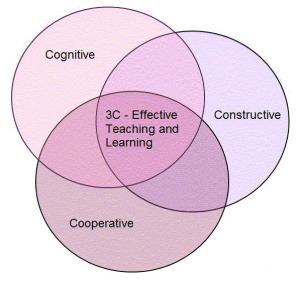What is the central focus in your classroom or course? What is in the nexus of your instruction? Is it learning, performing, socializing, producing (or reproducing), obeying, memorizing, or something else? What is the most important thing for your students to remember from your class or course?
It is surprising to realize how often our everyday teaching practices contradict our teaching philosophy!
Thinking about the core purpose of education: helping students to learn. How easily it gets diverted from the original focus on learning, and becomes a rite of passage or about measuring academic performance!
In everyday language we use such a huge a variety of definitions for “learning” – like answering correctly, passing, “learning a lesson”, memorizing, and so on – that it is easy to get confused and think that measured performance is equal to learning. I don’t think it is. Sometimes performance as learning means just cramming information into short term memory in order to pass an assessment or evaluation. Then that information can be forgotten, and it never becomes the much needed intellectual capital of knowledge.
When we simply measure performance with assessments and evaluations, we only get to see the end result of students’ learning process. We don’t know how the skill or knowledge was acquired. We just know that this student passed an exam, or created an acceptable product. But the “learning” behind the score may not not what the educational systems wish it was: this kind of surface or strategic learning is usually not learning for life. It is memorizing for survival in testing-oriented educational context.
To change the learning context we must focus much more on supporting students’ learning process, because acquiring transferable and life-long knowledge and skills is exactly what real learning is, or what it should be. When we are too busy cramming all the minor details of our beloved subject matter into the lesson or syllabus, we easily forget what learning really is about: for students to construct their own understanding of the subject. Not only reproduce something the textbook says, but to use critical thinking in order to fully understand the topic and how it relates to the world where student lives. Decontextualized learning is shallow or superficial by default. This is why I am very critical about prescriptive curricular and instructional design – students have different ways of thinking, different ways of learning, and different ways of knowing, and education has to accommodate those needs in order to be effective!
The easiest ways that I know to engage in learning-centered education is to provide choices for students. Thinking about learning as acquisition and elaboration of information (Illeris, 2003), it is handy to let students choose how they obtain the information. Sometimes letting students have a choice of where they get the information is beneficial (yes, I think wikipedia is a good starting point, but obviously students will have to dig deeper than that, and provide appropriate references for their sources). Also providing choices for learning strategies supports both students’ self-regulation and their learning process. Does it really matter how your student learned the concept or topic, if they learned it well? In order to help students’ independent learning skills to grow even more, it is a great idea to provide choices for assignments and assessments, and use rubrics and formative feedback to guide students to the level of competence where they need to be. Naturally, each student will arrive to that point on their own, individual pace.
I know that standardized tests don’t really fit into this picture, but their purpose is not to support students’ learning. Those tests exist to provide numerical data for stakeholders in the form of summative evaluations, not to promote learning-centered education. As teachers we may not have enough voice to change the current educational policies, but engaging in learning-centered education helps students to be ready for both the tests and life.
How about making learning the central focus of your instructional practice?
Illeris, K. (2003). Toward a contemporary and comprehensive theory of learning. International Journal of Lifelong Education, 22(4), 396-406. doi:10.1080/0260137032000094814


3 Responses to “Learning-centered education”